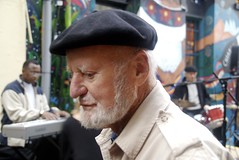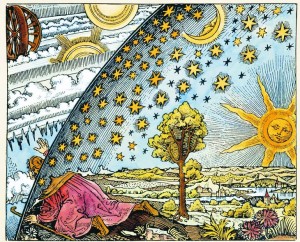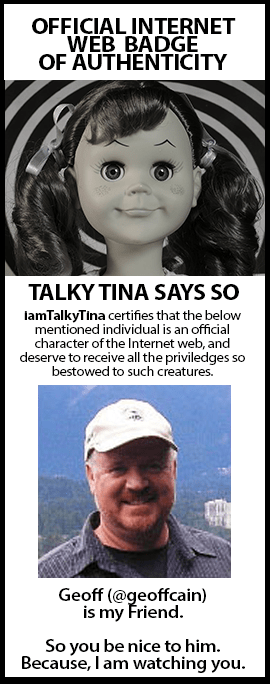I really thought Culture (I mean the exclusive education of privilege maintained by privilege) would have died years ago. Sven Birkerts and others have been predicting the death of The Book, Google is supposed be making us stupid, and instant messaging is supposed to turn us into twittering idiots, yet somehow things are not quite working out that way. Instead, books are more available than ever, social networking makes the authors and experts more accessible, and those same networks allow us to connect with others who are working along the same lines (or cause us to think differently). The same impenetrable silos of knowledge (The Ivy League) are now adopting an open courseware model because they are beginning to understand that information is not knowledge until someone applies, discusses, uses, and shares it. They really want an underprivileged high school student to be curious about New Media classes at MIT and to read their stuff.
 Image of Ferlinghetti by Steve Rhodes via Flickr
Image of Ferlinghetti by Steve Rhodes via Flickr
Imagine my surprise when I open up the Chronicle of Higher Ed and read in an article called “The New Math of Poetry” by David Alpaugh that there is too much poetry in the world. That’s right: because of technology, there is too much poetry in the world:
“Len Fulton, editor of Dustbooks, which publishes the International Directory of Little Magazines and Small Presses, estimates the total number of literary journals publishing poetry 50 years ago as 300 to 400. Today the online writers’ resource Duotrope’s Digest lists more than 2,000 ‘current markets that accept poetry,’ with the number growing at a rate of more than one new journal per day in the past six months.”
His complaint is that with all that poetry, we may miss the new Blake or Dickinson because the traditional filters of Culture (and please, do not reach for that revolver) are no longer in place. He says that no one can possibly read that much poetry and that
“professionals can ignore independent poets and reserve the goodies—premiere readings, publications, honors, financial support—for those fortunate enough to be housed inside the professional poetry bubble.”
That is already the case. That has been the case for far too long. How many Blakes or Dickensons have we lost because they could not get into Yale or any college for that matter? Or didn’t have the proper letters of recommendation to get through the doors of a publishing house? He does admit that Thoreau and Whitman were self-published. Yet he doesn’t tell us how a volunteer army nurse and bum (Whitman) would get published in the academic poetry world before print-on-demand, lets say in the 1950s. Whitman would have died in obscurity if he waited to communicate. He continued to publish, not because he had the imprimatur and nihil obstat of Harvard, but because people read his poetry and bought his books. Emerson praised his work but the universities thought his work obscene and he had only one poem anthologized (a mummification process for poets) in his lifetime.
I also know some really great poets who only recently have made it into the anthologies because their poetry did not come out of the conservative academic tradition: they sinned by becoming popular before they were critically acclaimed. The first time I saw Ferlinghetti in a college anthology was in the early 90s for a single poem. There are a couple sides to poetry and one of them is the academic scene where the Status Quo gets to decide who is and who is not a poet. There is the MFA side where those who join the lodge publish fellow lodge members (secret handshake revealed upon final tuition payment). And then there is everyone else, who, despite themselves, can’t help writing poetry, making videos, recording podcasts and producing art because that is what humans do and have been doing for 10,000 years. That is the frightening news flash: we are all poets. Ferlinghetti used to call for poetry to be recognized as a universal language, he opened his “Populist Manifesto” with
Poets, come out of your closets,
Open your windows, open your doors,
You have been holed up to long
in your closed worlds.
Technology is an opening of that window. More people can communicate and in a wider array of media than ever before. We should not be sitting on the ground telling sad tales of reading and the death of reading: people are reading and writing more than ever. They are just not reading and writing along the old model. People are creating videos, journals and blogs and listening to poetry in new ways that allow everyone to participate. And no, the professors will not have time to tell us who to include and who to exclude. It is up to us now.

![Reblog this post [with Zemanta]](http://img.zemanta.com/reblog_e.png?x-id=a92140b3-5716-4aa2-aa5a-abe12c042b3c)



